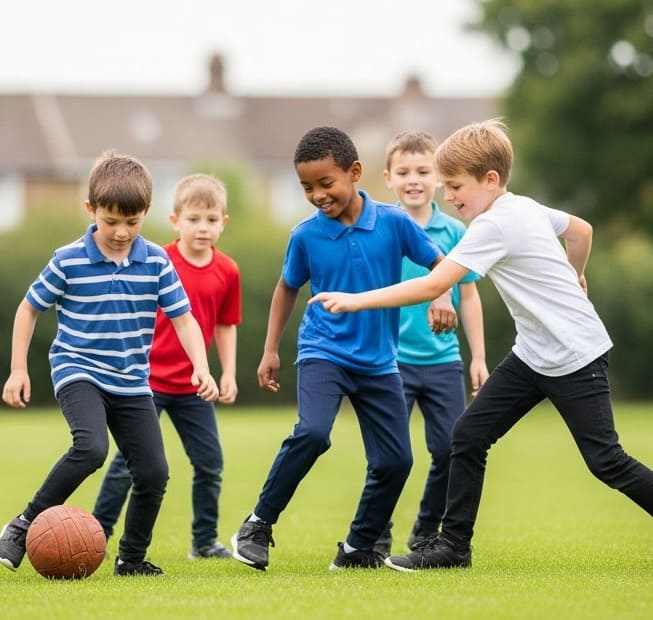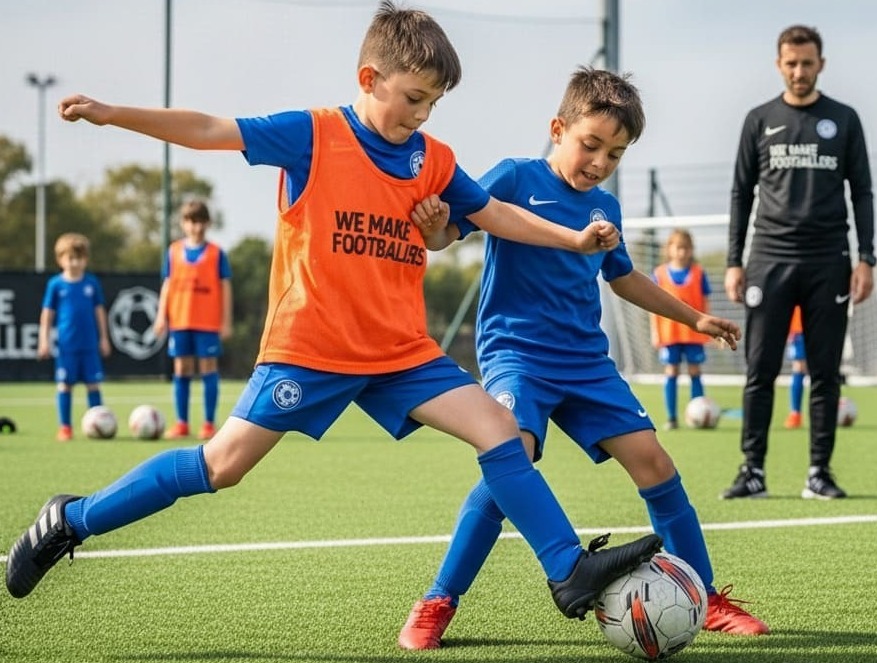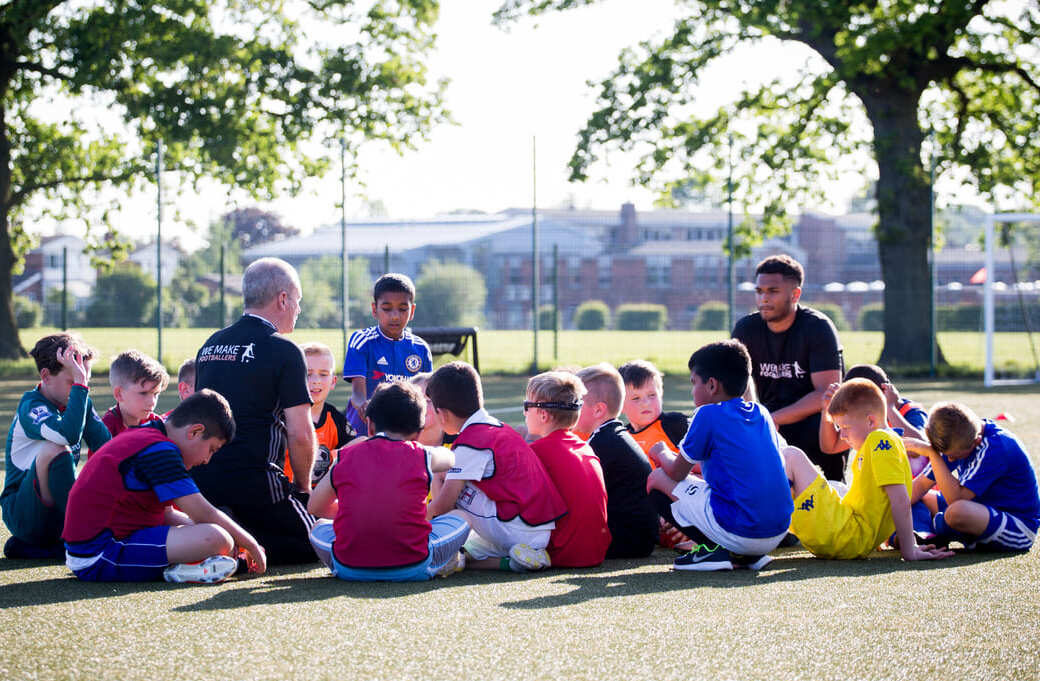Competition and sportsmanship are two aspects of sport which have suffered from an either/or approach in recent years, with the commonly held misconception that teaching children both is not possible.
You hear about this being played out at school sports days in which there are no winners for fear of competition and the impact it might have on those who do not come first.
On the flip side, the number of stories appearing whereby children’s football matches and other sporting events descend into ugly scenes through a lack of sportsmanship are on the rise.
It is therefore easy to understand how and why this misconception has been allowed to take hold.
A happy medium between competition and sportsmanship does not seem to exist, making it no surprise that most working with children prioritise one over the other in school and extracurricular activities.
The truth is that competition and sportsmanship go hand-in-hand when it comes to youth football.
Teaching children the value of both not only improves their performance on the pitch, but also helps impart important life lessons.
Getting the balance correct can be difficult but it’s something We Make Footballers believe is vital. Here are some of the reasons why.
The Importance of Competition in Youth Football

Those who remove competition from sport often do so because they don’t understand or haven’t considered the positive impact it can have on a child.
They don’t want anyone to lose or fail when in actual fact, losing or failing is one of the best ways for children to learn and improve. But more on that in a minute.
So, why is competition important in youth football? Firstly, it encourages teamwork and collaboration. The best teams in the world are those who work together for a common goal.
Lionel Messi might be one of the greatest football players of all time, but he would be the first to admit that without the likes of Emiliano Martinez, Alexis Mac Allister and Julian Alvarez, Argentina would not have won the 2022 FIFA World Cup.
The only way to win is by understanding that success is achieved through collaboration. Meaningful competition therefore helps and encourages children to become better team players as they work together towards a common goal.
Without competition, that goal does not exist and there is less incentive to become a good team player.
The FA Four Corners model – which informs the We Make Footballers syllabus – places emphasis on teamwork as part of the social corner. Competition plays a big part in how We Make Footballers help drive those skills forward.
Competition also provides motivation for improvement. Children stand a better chance of being a part of a winning team if they improve their technical skills along with their physical abilities.
Teaching children the importance of competition through playing football therefore encourages and motivates them to practise using their weaker foot or master the Cruyff Turn. It gives them a reason to become fitter, stronger and quicker.
In this way, competition makes children better football players and benefits their health and wellbeing. Without it, that incentive to become the best a child can possibly be is missing.
The Importance of Sportsmanship in Youth Football
Good sportsmanship in youth football is important because it goes beyond what happens on the football pitch. Good sportsmanship teaches children respect and self-control, helping them become better people.
In a football sense, it highlights their emotional intelligence and showcases a good mentality. These are traits that professional academies are increasingly looking for when scouting young players.
A child could have the ability of Cristiano Ronaldo, but if they show bad sportsmanship through not handling defeat well, then it suggests they do not yet have the mental resilience required to make it in the professional game.
Being a good team player and having the right attitude is as important as any technical skill. Playing fair and being gracious in victory or defeat are good traits to have on the football pitch and in general life.
The Importance of Losing in Youth Football
There is one overriding reason why we believe teaching the importance of both competition and sportsmanship is vital – because they both tie into what happens when children lose or fail.
Without competition and a desire to win, losing does not matter as much. And without being a good sportsman, a child who loses can be upset, bristle, look to blame others and not appreciate the talents of their opponents.
Losing is part and parcel of life and the best football players are those with a willingness to learn and improve based on setbacks.
Children who do not value winning will have less motivation to avoid losing next time, and with that comes less inclination to improve.
Children who are bad sportspeople will have little inclination to understand what went wrong, look at the areas they need to improve and – most importantly - build resilience from it.
Because setbacks happen in all walks of life. Everybody makes mistakes. Even a football player like Harry Kane can miss a crucial penalty for England in the final 10 minutes of a World Cup quarter final against France.
Kane’s response? Although distraught, he shook hands with his French counterparts afterwards. He was humble and acknowledged his mistakes in interviews.
And then within the next six months, he broke Wayne Rooney’s international goal scoring record for the Three Lions – with a successful penalty, of course – and ended the season with his joint-best Premier League career tally of 30 goals.
Some way to bounce back, that. And it would not have been possible had Kane not understood the importance of losing and being such a gracious, good sportsman.
Creating a Positive Competitive Environment
Having already established the difficulties in teaching children the importance of both competition and sportsmanship, how then do we set about achieving it? The answer is through creating a positive competitive environment.
We encourage our children to want to win but at the same time, help them understand that losing is part and parcel of the game and should be viewed as an opportunity.
This is achieved through our practice makes permanent philosophy.
Young footballers attending their weekly We Make Footballers sessions know that mistakes are part of the learning process.
The only way to overcome them is by not becoming downhearted but continuing to practise until a particular skill has been mastered – or as we like to say, made permanent.
To help with this, we’ll set realistic goals and expectations for each child based on their abilities. When every young football player is reaching their target every few weeks, it creates a more positive environment than constant failure through unrealistic expectations.
Children cannot understand the importance of competition if they never succeed.
The feelgood factor and mental boost from winning – be it in a team or through an individual achievement like scoring with a weaker foot for the first time – only comes if the initial target was realistic.
A 5-year-old at a We Make Footballers academy is not going to be playing defence splitting through balls like Kevin De Bruyne within their first month of football.
Children are also encouraged to compete with integrity, display good sportsmanship regardless of the outcome and respect their coaches, opponents and match officials.
We Make Footballers recognise both team and individual performances, which acknowledge the efforts and progress of the entire group.
In this way, children see that everyone in their football training class is part of the team and this helps remove the individualistic attitude which can often underpin a football player being a bad loser.
Training Academies Are for Players of All Abilities
Finally, we teach children the importance of competition and sportsmanship by offering football training classes to all children regardless of ability.
This helps remove ultra-competitiveness and allows us to deliver on their promise of football in a fun and safe environment.
Children of all skill levels enjoy their football as they can see they are improving every week, friendships are formed, with effort and enthusiasm very much valued.
Those two traits help young football players in our academies better understand sportsmanship; that it is not all about having the most talent, but those who work the hardest and do their best are just as, if not more, valued.
By striking the correct balance between competition and sportsmanship, We Make Footballers aims to improve the footballing ability of all children who sign up to an academy at the same time as teaching them the values of respect, integrity and having a positive mindset.
Football, sport and life in general all need both competition and sportsmanship. How better to learn that than through the beautiful game?
We Make Footballers offer weekly football training sessions for children aged 4 to 12 across England. Want to see how we can help your child develop their sportsmanship skills? Why not find your local academy and book your first session free of charge.



